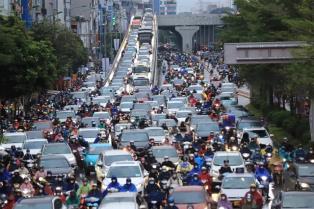Honda Viet Nam has proposed that the Government develop measures to support local automobile manufacturers to assure they can compete with imported autos.
 |
| Workers build a car at a factory in Viet Nam. Honda Viet Nam has suggested the Government develop measures to help local automobile manufacturers improve their competitiveness. — Photo fica.vn |
HA NOI (Biz Hub) — Honda Viet Nam (HVN) has proposed that the Government develop measures to support local automobile manufacturers to assure they can compete with imported autos.
HVN General Director Minoru Kato said on May 22 that the Government's supporting policies for the domestic automobile industry had yet to be issued, while the deadline moves closer to enacting tariffs on imports from ASEAN markets, which would be cut to zero per cent in 2018.
Meanwhile, in general it would take automobile manufacturers two or three years to prepare for the manufacturing of new models, he said at a meeting held to review business activities in the 2015 fiscal year.
Without supporting policies from the Government, local manufacturers could move to import cars from Thailand and Indonesia, or other markets, to sell domestically, instead of maintaining their production bases in Viet Nam, he warned.
Therefore, it would depend on Government policies to assure the continuation of domestic auto manufacturing, he said. The HVN and other businesses in the Vietnam Automobile Association were working with the Government to calculate import tariffs and special consumption taxes for automobiles.
Meanwhile, General Director of Toyota Viet Nam, Yoshihisa Maruta, told Dat Viet online newspaper that with tax cuts, it would be cheaper to import cars in complete built unit (CBU) than importing car parts for domestic assembly.
Further, the company was discussing with the Government how to determine the best solution, in the context of the import tariff from ASEAN being cut to zero per cent by 2018. Concerns linger that the difference between the cost of domestically-assembled automobiles and imported cars would affect local production, he said.
He noted that it should be understood that production costs are much lower than the vehicles' stated prices. Therefore, the Government should support local manufacturers to help reduce the gap between the production cost and selling price by initially adjusting tax policies until the market size becomes larger.
He explained that, at present, the special consumption tax for domestically-assembled automobiles was based on their wholesale price, plus other costs, such as administrative expenses, transport costs and profits by manufacturers. Meanwhile, the special consumption tax for imported vehicles was based on their cost, insurance, and freight value, plus current import tariffs.
This meant that special consumption taxes for domestically-assembled autos were higher than for imported cars.
The Government should adjust the calculation of the special consumption tax and apply the same calculation for both domestically made cars and imported ones, which met the development orientation, as set in the master plan to develop the local automobile industry and approved by the Prime Minister, he said. — VNS
- Tags
- Honda Viet Nam
- automobile





